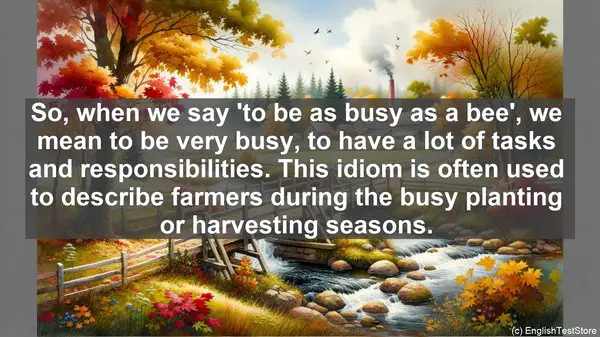Introduction: The Language of Agriculture
Welcome to today’s lesson . As you know, agriculture is not just about growing crops or raising livestock. It’s a way of life, with its own set of challenges and rewards. And just like any other field, agriculture has its own language, filled with idioms and expressions that are unique to the farming and ranching community. In this lesson, we’ll explore 10 such idioms that are commonly used by farmers and ranchers. So, let’s get started!
1. ‘To sow the seeds’
When we say ‘to sow the seeds’, we’re not just talking about the physical act of planting seeds in the ground. It’s a metaphor for starting something, for laying the foundation. Just like a farmer carefully sows the seeds, we too need to plan and prepare before we begin any project or venture.
2. ‘To be in the same boat’
Farming is a tough job, and farmers often face similar challenges. That’s why we say ‘to be in the same boat’. It means to be in the same situation or facing the same difficulties as someone else. This idiom reminds us that we’re not alone in our struggles, and that there’s strength in unity.
3. ‘To milk something for all it’s worth’
Milking cows is a daily task for many farmers. But when we use the idiom ‘to milk something for all it’s worth’, we’re not talking about actual cows. It means to make the most of a situation or an opportunity, to extract every possible benefit. Just like a farmer milks a cow to get all the milk, we should make the most of every chance we get.
4. ‘To be as busy as a bee’
Bees are known for their constant activity. They’re always buzzing around, collecting nectar and pollinating flowers. So, when we say ‘to be as busy as a bee’, we mean to be very busy, to have a lot of tasks and responsibilities. This idiom is often used to describe farmers during the busy planting or harvesting seasons.
5. ‘To separate the wheat from the chaff’
Separating wheat from chaff is an important step in the grain harvesting process. But this idiom goes beyond farming. It means to distinguish between what’s valuable and what’s not, to separate the good from the bad. In any situation, whether it’s making decisions or choosing the right employees, it’s important to separate the wheat from the chaff.

6. ‘To be a cash cow’
In farming, a cash cow is a livestock that consistently brings in money. But when we say ‘to be a cash cow’ about a person or a business, it means they’re a reliable source of income or profit. Just like a cow that provides milk and meat, a cash cow is something or someone that brings in continuous financial benefits.
7. ‘To be in the weeds’
Weeds are unwanted plants that compete with crops for resources. So, when we say ‘to be in the weeds’, we mean to be caught up in small, unimportant tasks or details, losing sight of the bigger picture. This idiom reminds us to stay focused on what’s important and not get overwhelmed by minor issues.

8. ‘To be a tough nut to crack’
Some nuts are easy to crack open, while others require a lot of effort. When we say ‘to be a tough nut to crack’ about a person or a problem, it means they’re difficult to understand or solve. Just like a farmer needs patience and persistence to crack open a tough nut, we too need perseverance when faced with challenges.
9. ‘To be as stubborn as a mule’
Mules are known for their stubbornness. They can be resistant to change or refuse to do something. So, when we say ‘to be as stubborn as a mule’ about a person, it means they’re very stubborn or unyielding. This idiom reminds us that sometimes, we need to be flexible and open to new ideas, just like a farmer who adapts to changing conditions.
10. ‘To reap what you sow’
In farming, the act of sowing seeds is followed by the act of reaping, or harvesting, the crops. But this idiom goes beyond agriculture. It means that the consequences of our actions, whether good or bad, will eventually come back to us. Just like a farmer who reaps the fruits of his labor, we too will experience the outcomes of our choices and actions.
Conclusion: The Power of Language
Language is more than just words. It’s a reflection of our culture, our experiences, and our way of life. By understanding and using idioms, we not only enhance our communication skills, but we also gain insights into the rich world of agriculture. So, as you continue your journey in farming or ranching, remember the power of language and the stories it tells. Thank you for watching, and see you in the next lesson !
